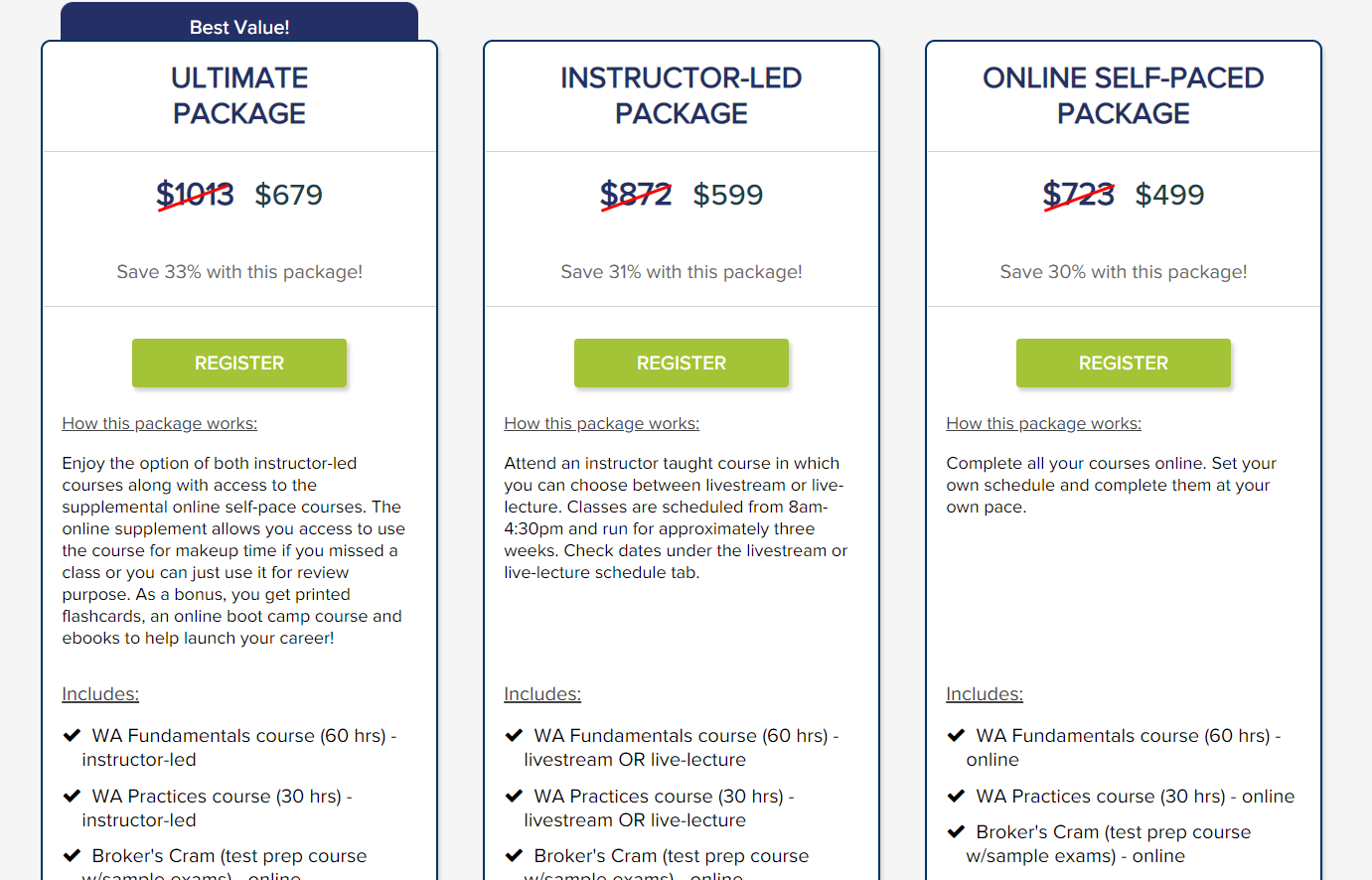
When you go for the Washington real estate licensing exam, you should bring two forms of ID with your name, signature, and current photograph. Remember that the results of this exam are only valid for a year. So you must apply to get your broker's license. You will receive instructions for how to take the exam again if you fail it. Once you have passed the exam, you can submit your official application.
Pre-licensing education requirements
Washington's state requires that all real estate agents must have completed at least 90 hours of education in order to pass their licensing exam. This 90-hour course covers topics such as contracts, finance, real estate principles and other important subjects. The online courses provide access to multiple modules which cover different topics. The study guides and optional tests will help students prepare for the real-estate exam.
Washington State Department of Licensing and Regulation requires every applicant to pass a background screening before they are allowed to take the real estate exam. The state licensing testing agency must be registered before the candidates can take the exam. Candidates must also show proof of their course completion. They must pass a broker's exam and answer legal background questions. A background check must be conducted every six years. This information will also be available for applicants who have previously completed pre-licensing training in another state.

Exam content
The WA licensing exam in real estate includes two parts. One is the national section and one is the state-specific. The questions on each portion are interspersed. About five to ten questions will be considered experimental and not scored. Each portion has multiple-choice questions. The test taker has 3.5 hours for each part. A scaled score of 70 or more is required to pass the test. The test content is generally comprehensive and covers all aspects state's real property laws, contracts, as well as procedures.
The pre-licensing course covers many the same topics as that of the exam. The basics of real estate math are required. Practice tests are a great way to improve your score. Practice tests can also be used to review the format and highlight your weak areas. You should also memorize a few facts and math formulas that you've learned in your pre-licensing course.
Cost
The cost for real estate licensing in each state varies, as does the type and size of your business. The cost of a salesperson license will be less than that of a broker license. This is because the former requires additional education and fees. The cost of real estate licensing may be more costly if you're starting from scratch. But, it is possible to cut costs by creating a business plan, identifying your clients, and creating a business plan. You have many marketing options, including print ads, digital ads and social media campaigns.
Pre-licensing courses cost between $260 and $500 depending on the location. Once you have completed the required course, you'll have to pass the state licensing exam. Additional fees for membership to the MLS are $50-60. MLS membership fees vary by region, so you'll have to check your local fees to determine the actual cost. A separate fee will be required to become a National Association of Realtors member.

Online options
Choosing an online school for your Washington real estate licensing requirements can be an advantageous decision. Online schools offer a way to study at your own pace, and you can access all the information you need in a fraction of the time it takes for classroom-based schools. Additionally, instructors will provide tutor support and exam prep assistance. Exam Preparation Plus allows you to purchase an upgrade for your course. This includes a real e-book, live exam cramer series and Q&A sessions.
Kaplan offers five WA prelicensing packages. You can choose from the Premium or Value packages depending on your needs. These packages include three online courses that require fewer than nine credit hours each. The two packages let you complete the coursework at your convenience. You can also resume where you left off, if necessary. Kaplan's courses feature seasoned real-estate professionals who provide current and pertinent information.
FAQ
What are the most important aspects of buying a house?
The three most important factors when buying any type of home are location, price, and size. Location is the location you choose to live. Price refers the amount that you are willing and able to pay for the property. Size refers how much space you require.
How can I determine if my home is worth it?
It could be that your home has been priced incorrectly if you ask for a low asking price. You may not get enough interest in the home if your asking price is lower than the market value. Our free Home Value Report will provide you with information about current market conditions.
What should you think about when investing in real property?
The first step is to make sure you have enough money to buy real estate. If you don't have any money saved up for this purpose, you need to borrow from a bank or other financial institution. It is also important to ensure that you do not get into debt. You may find yourself in defaulting on your loan.
You also need to make sure that you know how much you can spend on an investment property each month. This amount must include all expenses associated with owning the property such as mortgage payments, insurance, maintenance, and taxes.
Finally, ensure the safety of your area before you buy an investment property. It would be best to look at properties while you are away.
What are some of the disadvantages of a fixed mortgage rate?
Fixed-rate mortgages tend to have higher initial costs than adjustable rate mortgages. If you decide to sell your house before the term ends, the difference between the sale price of your home and the outstanding balance could result in a significant loss.
How can I eliminate termites & other insects?
Termites and many other pests can cause serious damage to your home. They can cause serious damage to wood structures like decks or furniture. A professional pest control company should be hired to inspect your house regularly to prevent this.
Can I buy a house in my own money?
Yes! Yes! There are many programs that make it possible for people with low incomes to buy a house. These programs include FHA loans, VA loans. USDA loans and conventional mortgages. For more information, visit our website.
How many times may I refinance my home mortgage?
This will depend on whether you are refinancing through another lender or a mortgage broker. You can typically refinance once every five year in either case.
Statistics
- The FHA sets its desirable debt-to-income ratio at 43%. (fortunebuilders.com)
- Over the past year, mortgage rates have hovered between 3.9 and 4.5 percent—a less significant increase. (fortunebuilders.com)
- This means that all of your housing-related expenses each month do not exceed 43% of your monthly income. (fortunebuilders.com)
- When it came to buying a home in 2015, experts predicted that mortgage rates would surpass five percent, yet interest rates remained below four percent. (fortunebuilders.com)
- It's possible to get approved for an FHA loan with a credit score as low as 580 and a down payment of 3.5% or a credit score as low as 500 and a 10% down payment.5 Specialty mortgage loans are loans that don't fit into the conventional or FHA loan categories. (investopedia.com)
External Links
How To
How to be a real-estate broker
The first step in becoming a real estate agent is to attend an introductory course where you learn everything there is to know about the industry.
Next you must pass a qualifying exam to test your knowledge. This involves studying for at least 2 hours per day over a period of 3 months.
Once this is complete, you are ready to take the final exam. To become a realty agent, you must score at minimum 80%.
All these exams must be passed before you can become a licensed real estate agent.